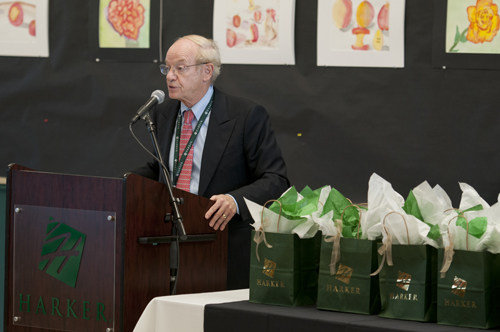This story was originally published in the spring 2012 issue of Harker Quarterly.
The Harker community breathed a collective sigh of relief on Feb. 1, the date that marked the completion of more than a year of intense self-reflection and evaluation as part of the school’s reaccreditation process for the Western Association of Schools and Colleges (WASC) and California Association of Independent Schools (CAIS). Harker was awarded the maximum full six-year accreditation in 2006, and the present process for hopefully a further six-year nod was a schoolwide, all-hands-on-deck project.
Each accreditation cycle, CAIS-WASC supplies a template report which Harker is obliged to fill out, covering our philosophy, governing body, finances, fundraising, administration, faculty, staff, students, community, K-12 program, library, plant, health and safety, and an action plan; each of these divisions comprises a chapter in the more than 300-page document that the school prepares for a visiting accreditation team. The team was provided this report in late November, allowing them to prepare for an intensive, three-day visit Jan. 29- Feb. 1, during which they tried to delve as deeply as possible into the life of the school by visiting all three campuses, meeting people and absorbing as much of the culture as they could. The visit culminated in an all-school meeting at the middle school campus on Feb. 1, when the committee head, Larry Dougherty, head of school at The Buckley School in Southern California, addressed the faculty and staff to offer his team’s commendations and recommendations.
On all California schools’ accreditation teams, one member visits on behalf of WASC, while the others represent CAIS; the team then submits a joint recommendation to CAIS and WASC for the appropriate tenure of accreditation, with six years with no follow-up visit being the maximum amount awarded. Harker’s accreditation team was particularly appropriate for observing Harker; all from independent California schools, the group comprised four heads of school/principals, an assistant head of school, a director, an admissions director, a technology director, an academic dean and a director of instructional advancement.
The dynamic group dove into their responsibilities and could be spotted in classrooms and lunch areas, chatting with students and faculty throughout their visit. Their schedule, overseen by Jennifer Gargano, assistant head of school for academic affairs, included meetings with every academic department K-12; meetings with subsets of the committees who worked on each chapter of the report; school meetings at the middle and upper schools; and student council meetings, breakfasts and even fire drills at all three campuses. Many students and teachers found themselves being pulled aside for friendly chats, and the final day of the visit allowed committee members time to ask any last questions of the administration or other staff.
On the final day of the visit, Dougherty addressed the entire community to officially conclude their visit. While a detailed report of the committee’s findings will be sent to Harker in the spring, Dougherty did verbally commend the faculty, staff, students, administration, board of trustees, finance, business office and support staff for their excellent work. Perhaps even more gratifying, however, was that the CAIS-WASC team’s recommendations for development and improvement supported ones that the school has already identified for improvement, and in fact had been included in the self-study as places for growth.
After getting through the nitty-gritty, Dougherty said that he had some “warm fuzzies” to deliver, pointing out two special people who have so much to do with Harker’s success. The first was Gargano, whose comprehensive plan and hospitality for the CAIS-WASC team’s visit was truly exceptional. The other was Diana Nichols, and by extension her late husband, Howard Nichols, Harker’s longtime leaders and the founders of the upper school. Diana Nichols, who was present, is currently the chair of the board of trustees. Dougherty commended them on establishing and preserving the school’s family atmosphere and for choosing a successor (Chris Nikoloff) with such care and success.
His next comment, “As a committee, we’ve been Harkerized,” drew a warm laugh from the assembled group. After joking that he gained two pounds from the excellent food, Dougherty said he and his team are leaving inspired. He mentioned that all the people his team met were “on a journey” of continual learning, unwilling to settle and compromise, but rather continually seeking personal and professional growth. The children they spoke to had two main reactions when asked about their classes: they cited their teachers’ love and passion for learning and teaching, and the intense care the faculty feels for their students as individuals.
Pointing out that accreditation is a “mutual growth process,” Dougherty concluded that he and his team would be bringing wonderful ideas home to their schools, saying, “You really have set a standard that all schools should aspire to.”
Chris Nikoloff sent a congratulatory message to the Harker community when the visit was concluded, thanking the faculty and staff for their hard work in preparing the report and meeting with the committee: “Places like Harker do not spring up overnight, and take the concerted effort of talented, kind and caring people like you to continue its journey in excellence. While the structure of an organization may take different shapes over time, the core values, reflected in the people around us, are timeless.”
